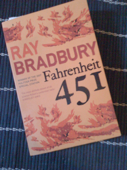
Ray Bradbury
Fahrenheit 451
Harper Collins, 1953 [SF, Eng, H3]
–––––––––––––––––––––––
Fahrenheit 451: the temperature at which book-paper catches fire and burns.
Guy Montag is a fireman. His job is to burn books, which are forbidden, being the source of all discord and unhappiness. Even so, Montag is unhappy; there is discord in his marriage. Are books hidden in his house? The Mechanical Hound of the Fire Department, armed with a lethal hypodermic, escorted by helicopters, is ready to track down those dissidents who defy society to preserve and read books..
The classic novel of a post-literate future, Fahrenheit 451 stands alongside Orwell’s 1984 and Huxley’s Brave New World as a prophetic account of Western civilization’s enslavement by the media, drugs and conformity.
Bradbury’s powerful and poetic prose combines with uncanny insight into the potential of technology to create a classic of twentieth-century literature which over fifty years from first publication, still has the power to dazzle and shock.
–––––––––––––––––––––––
Though famous, Fahrenheit 451 has been for a long time one of the many Bradbury’s books I hadn’t read: I believed I knew the underlying story - somewhere in the future people are burning books and are forbidden to read them - and that was enough… But there is more.
Together with an unexpected comment - “Ignorance is bliss” - the book describes a frightening social system where people’s minds are kept idle by endless tv shows that restrain them from having any own ideas or emotions.
The story was written in 1953, when television was still so far away in the future. About 56 years later, I wonder how close we are to that result.


